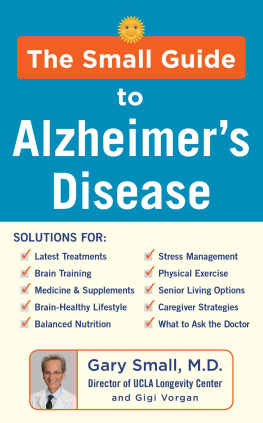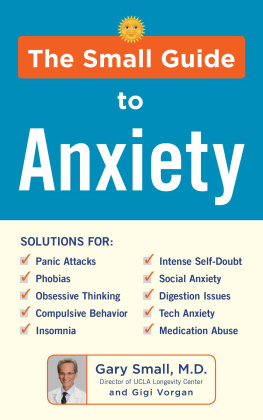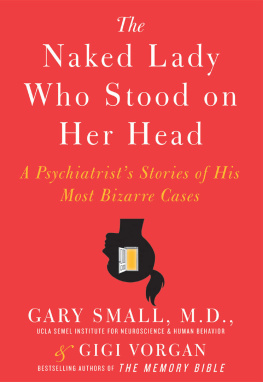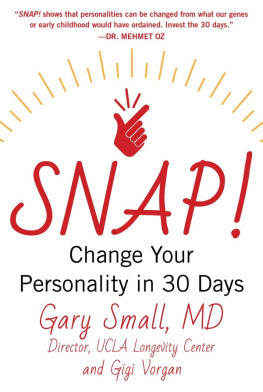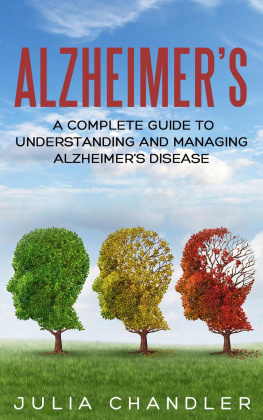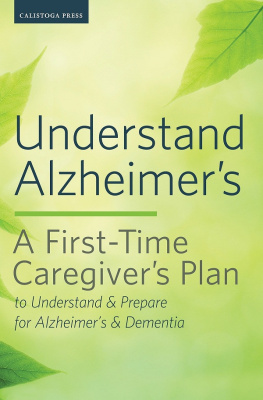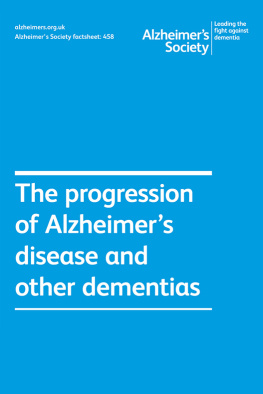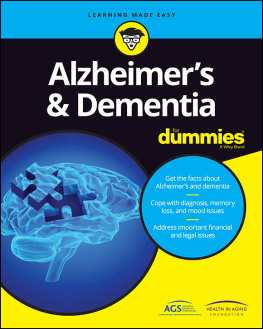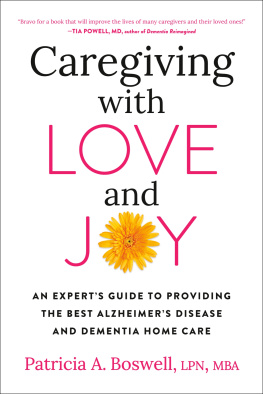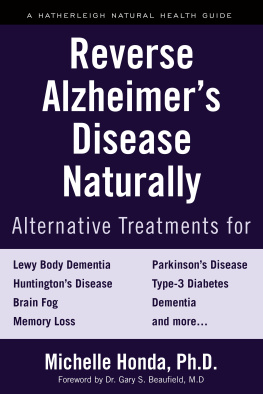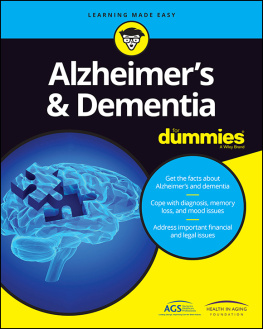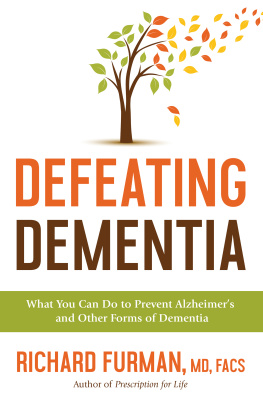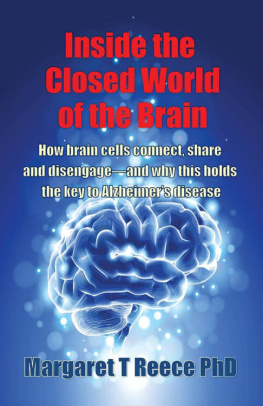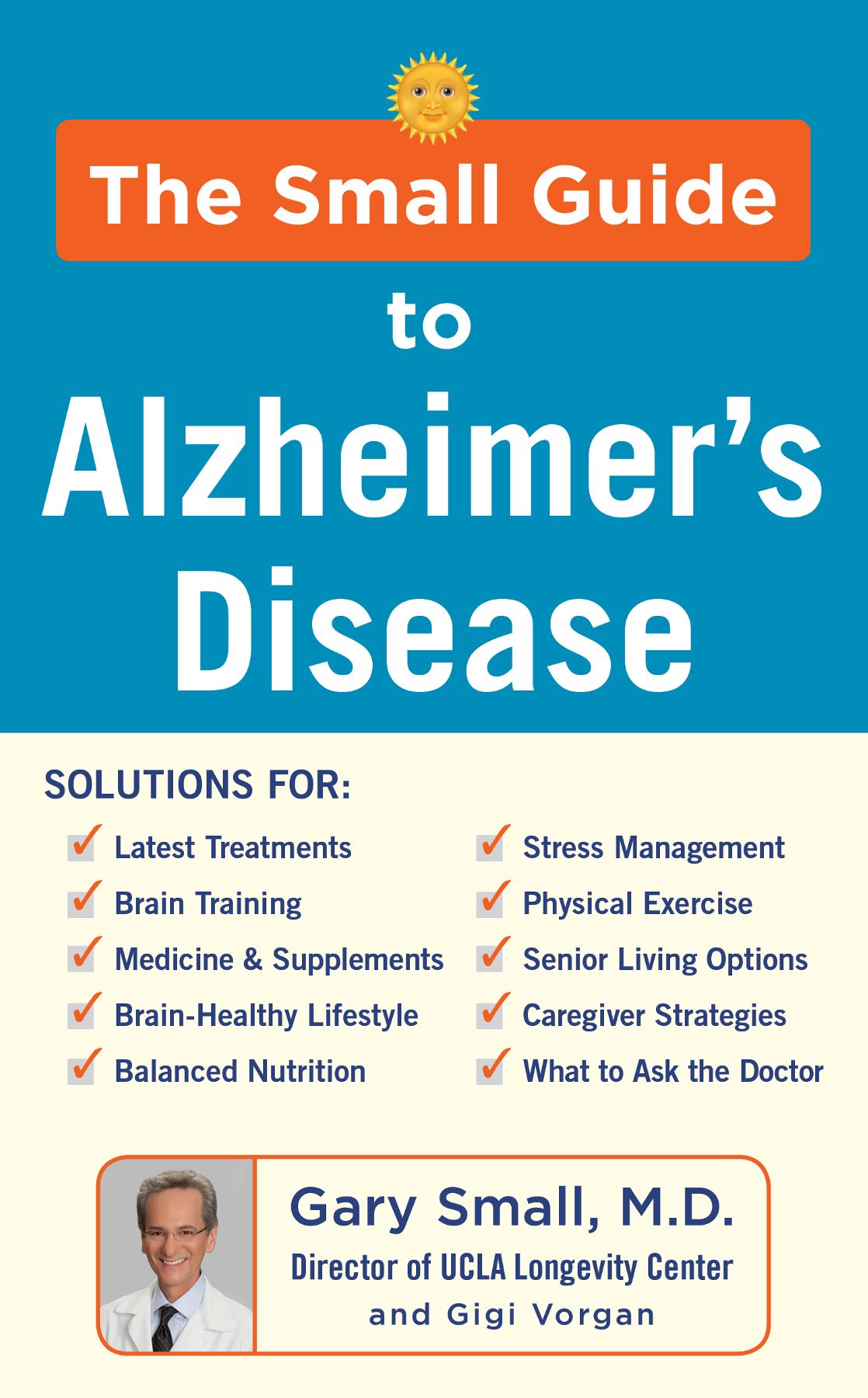
The Small Guide to Alzheimers Disease
The Small Guide to Alzheimers Disease
Gary Small, M.D., and Gigi Vorgan

www.humanixbooks.com
Humanix Books
The Small Guide to Alzheimers Disease
Copyright 2020 by Humanix Books
All rights reserved
Humanix Books, P.O. Box 20989, West Palm Beach, FL 33416, USA
Library of Congress Cataloging-in-Publication Data is available upon request.
No part of this book may be reproduced or transmitted in any form or by any means, electronic or mechanical, including photocopying, recording, or by any other information storage and retrieval system, without written permission from the publisher.
Interior Design: Scribe Inc.
Humanix Books is a division of Humanix Publishing, LLC. Its trademark, consisting of the words Humanix Books is registered in the Patent and Trademark Office and in other countries.
Disclaimer: The information presented in this book is not specific medical advice for any individual and should not substitute medical advice from a health professional. If you have (or think you may have) a medical problem, speak to your doctor or a health professional immediately about your risk and possible treatments. Do not engage in any care of treatment without consulting a medical professional.
ISBN: 978-1-63006-127-2 (Cloth)
ISBN: 978-1-63006-128-9 (E-book)
Contents
I n medical school, I spent a total of one hour studying Alzheimers disease. We learned a few facts about memory loss and other symptoms and peeked through a microscope at some brain tissue showing evidence of the disease. At the time, none of my professors or colleagues foresaw the looming epidemic of Alzheimers on the horizon. Today it is one of the most feared diseases next to cancer. By age 65, the risk for developing Alzheimers dementia is 10 percent, but by age 85, that risk skyrockets to almost 50 percentevery other person might become affected.
When I became a geriatric psychiatrist, my practice quickly filled with memory-impaired older patients and their worried spouses, adult children, and caregivers hoping for answers but fearing the worst. In The Small Guide to Alzheimers Disease, I describe how doctors assess, diagnose, and treat the disease; provide guidance for caregivers; describe the latest research; and share several stories of how people come face-to-face with Alzheimers in their familiesthe challenges they face, the choices they make, and how they can better understand and manage this often overwhelming condition.
Gary Small, M.D.
Los Angeles, CA
Is It Normal Aging or Something Worse?
As you get older three things happen. The first is your memory goes, and I cant remember the other two.
Sir Norman Wisdom
H elen, 56, flipped on the lights in the kitchen, walked straight to the pantry, and stopped dead. What did I come in here for? This kind of thing was happening more and more, and it was starting to worry her. Helen poured herself a glass of water and sat down to drink it. She and her friends often joked about getting older and forgetting things, but it didnt seem very funny now. She took another sip of water, then suddenly jumped up and ran to her bathroom, where shed left the tub filling.
Almost everybody experiences memory lapses from time to time, and age-related memory decline is normal. So why are we all so scared by it? Perhaps because our memory defines who we are. Without our memory we have no past, we cannot plan for the future, and we cant appreciate the present. Another reason memory slips can be so frightening is that they may be an early sign of Alzheimers disease, one of the scariest diseases we know.
Thanks to healthier lifestyles and medical advances, people are living longer than ever before in human history. In 1950, less than 14 million people reached age 80. By 2000, that number grew to 69 million, and by 2050, it is projected that nearly 380 million people will be 80 years or older. The rub is that this greater life expectancy has also escalated the risk for getting Alzheimers disease because age is the greatest single risk factor for developing it. In the United States alone, more than 5 million people suffer from Alzheimers dementia, which gradually robs them of their mental abilities. That number is expected to triple by 2050, making Alzheimers one of the most feared age-related diseases along with cancer.
In 1906, Alois Alzheimer presented to the medical community the first case of what eventually became a disease named after him. He described a woman whose symptoms of confusion began at age 51. In addition to her memory loss, she developed a paranoid psychosis, and her mental clarity rapidly declined until she died at age 55.
When Professor Alzheimer performed an autopsy on her brain, he applied special dyes to the tissue before viewing it under the microscope. He was then able to see, for the first time, the presence of amyloid plaques and tau tanglesabnormal, insoluble protein deposits that had accumulated in brain areas that control memory and thinking.
The medical community found Alzheimers presentation interesting, but they didnt pay too much attention to his findings. This was probably because it was assumed that Alzheimers disease was a rare neurodegenerative disorder that only afflicted a few people during middle age. It was thus classified as pre-senile dementia.
Attitudes and attention to the disease changed, however, in 1968, when a group of pathologists published a paper describing autopsy results of a series of older adults who had suffered from senility prior to death. The investigators used the same special dyes that Dr. Alzheimer had applied to the brain tissue of the patient he had presented 60 years earlier. This new study revealed the presence of the same amyloid plaques and tau tangles that were observed in Alzheimers original pre-senile case. Doctors subsequently talked about early-onset (before age 65) and late-onset (beginning after age 65) Alzheimers disease rather than pre-senile dementia and senility.
Prior to this new publication, doctors thought that senility was a normal part of aging. If Mom or Grandpa became confused and disoriented, the family would assume that it was just a normal part of old age and there was nothing to be done. The discovery that old-age cognitive symptoms could actually be due to an underlying disease was a wake-up call for researchers. When the scientific world learned of this discovery, doctors and scientists began taking Alzheimers disease more seriously because it was likely afflicting millions of older adults. This revelation also elicited tremendous fear among the general public who found out about the new epidemic of Alzheimers disease in older adults.
Regardless of the age at onset, Alzheimers disease is characterized by a gradual progression of symptoms and the accumulation of amyloid plaques and tau tangles in the brains frontal (under the forehead), temporal (beneath the temples), and other regions that control thinking and memory. It is the most common type of severe cognitive loss, or dementia, that disrupts patients ability to care for themselves.
- Fear: Im losing my mindIm going to end up in a nursing home.
- Denial: All my friends are forgetful at my agetheres nothing wrong with me.
- Anger: I get so mad when I cant find the right word.
Next page
